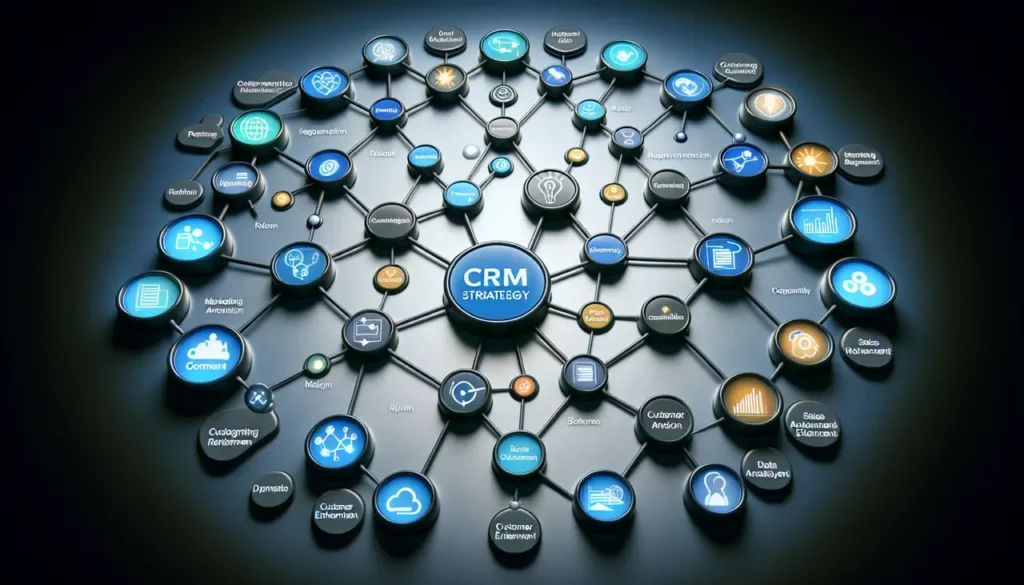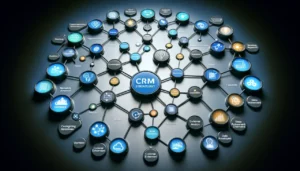In today’s fast-paced digital world, effectively managing customer relationships is crucial for business success. This is where Customer Relationship Management (CRM) systems come into play. Integrating CRM with digital marketing strategies can be a game-changer. But why exactly is this integration so important? Let’s dive in and explore!
Understanding CRM and Its Role
A Customer Relationship Management system is a technology for managing a company’s relationships and interactions with current and potential customers. It helps businesses improve customer service, increase sales, and enhance profitability.
At the heart of CRM is the ability to thoroughly understand your customers. It acts as a dedicated repository, centralizing customer information and interaction history. This means, with just a few clicks, marketers can access detailed customer data that unveils insights into their behavior, preferences, and needs.
By building a comprehensive database, CRM systems allow for consistent and personalized communication with each customer. This establishes trust and strengthens the bond between the customer and the business, fostering long-term loyalty.
Moreover, CRM systems streamline workflows. They automate many routine tasks, freeing up time for marketers to focus on crafting strategies and creative ideas. Thus, CRM not only improves internal efficiency but also elevates the overall customer experience, making it an indispensable tool in modern businesses.
How CRM Enhances Digital Marketing
CRM systems provide valuable insights into customer behavior, enabling marketers to build targeted campaigns. This enhances customer engagement and conversion rates, making CRM a crucial element of effective digital marketing.
Through the integration with digital marketing, CRMs offer a dynamic platform for personalized promotions and engaging content. Instead of adopting a one-size-fits-all approach, you can send tailored messages, offers, and recommendations that resonate with specific customer segments, creating a more meaningful connection.
For instance, a CRM integrated with email marketing tools can help automate sending personalized newsletters or promotional emails based on user preferences and past interactions. This targeted approach not only captivates the audience but also drives higher open rates and conversion metrics.
Further elevating your marketing efforts, CRM data can also feed into social media strategies, enhancing customer interaction through relevant content. By understanding what your audience values, you can engage them effectively on the platforms where they spend most of their time.
Benefits of CRM Integration
Integrating CRM with digital marketing strategies offers numerous benefits, such as improved customer segmentation, personalized messaging, and streamlined customer interactions, all of which result in better customer retention.
CRM integration provides a unified customer profile across all marketing channels. This means you can better segment your audience and create more finely tuned marketing efforts tailored to their unique preferences, increasing the chances of engagement and conversion.
The integration also aids in automating follow-ups and nurturing relationships through personalized messages that cater to the customer’s journey stage. This automation not only saves time but also ensures consistent communication, reinforcing brand presence.
Moreover, by combining CRM and digital marketing, companies can make more data-driven decisions, backed by precise insights gathered from customer interactions across various touchpoints. This strategic use of CRM data turns raw information into actionable strategies, optimizing both customer satisfaction and business outcomes.
Streamlining Data Management
A CRM system helps organize and track customer data efficiently. This integration ensures that data across different marketing channels remains consistent, leading to more effective marketing strategies and decisions.
Integrating CRM into digital marketing not only unifies data but also reduces redundancy. This centralization allows marketers to avoid duplicate data and inaccuracies that often plague campaign efforts working in silos.
An organized data repository provided by CRM can serve as a reliable single source of truth. This aids marketers in instantly pulling up customer histories and preferences, facilitating a more proactive approach to marketing.
Furthermore, centralized data management can improve data privacy compliance, as CRM systems are designed to securely manage customer information, reducing the risk of data breaches.
Improving Analytics and Reporting
With CRM integration, businesses gain access to comprehensive analytics and reporting tools. This allows for a better understanding of marketing performance and customer behavior, helping to refine and optimize marketing efforts over time.
CRM systems, when integrated, provide insightful reports that detail the effectiveness of marketing campaigns. These analytics go beyond traditional metrics, offering visibility into conversion rates, customer feedback, and engagement trends. By understanding these patterns, businesses can tailor their strategies more precisely.
Moreover, by integrating CRM data into digital marketing reports, businesses can bridge the gap between their marketing activities and actual sales conversions. This clarity significantly enhances decision-making processes, paving the way for campaigns that truly resonate with the audience.
To sum it up, a well-integrated CRM and digital marketing strategy not only streamlines operations but also delivers actionable insights that can propel a business into achieving its strategic goals efficiently.
Wrapping It All Up
In conclusion, integrating a CRM strategy into your digital marketing efforts not only enhances customer interactions and personalizes marketing initiatives but also ensures better data management and improved analytics. This strategic integration is vital for businesses aiming to stay competitive and thrive in the digital age.






